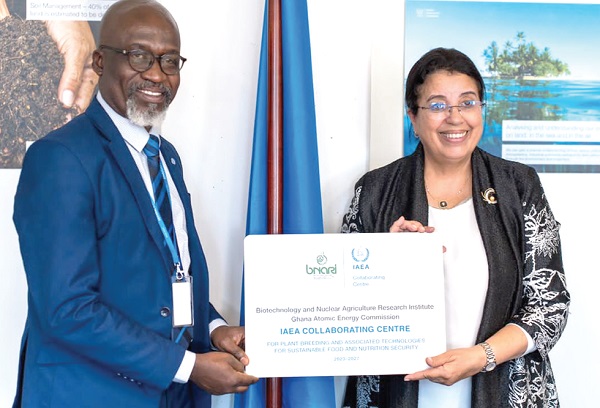
Atomic Energy Commission, IAEA sign agreement on ensuring food security
An agreement has been signed between the Ghana Atomic Energy Commission (GAEC) and the International Atomic Energy Agency (IAEA) on plant breeding and related technologies to ensure sustainable food and nutrition security.
The agreement, which will span 2023 - 2027, and subject to renewal, makes the Biotechnology and Nuclear Agriculture Research Institute (BNARI) of GAEC the first in sub- Saharan Africa to be designated as an IAEA Collaborating Centre for plant breeding and related technologies.
The agreement which was signed in Vienna, Austria, would also strengthen research and develop capacities to improve crop varieties in Africa.
The Director-General of GAEC, Prof. Samuel Boakye Dampare, and the IAEA Deputy Director-General and Head of the Department of Nuclear Science and Applications, Najat Mokhtar, both signed for their respective organisations on the sidelines of the 67th Annual General Conference of the IAEA in Austria.
Some of the crops that would be given special attention under the agreement because of their socio-economic significance are cassava, sweet potato, tomatoes, sorghum and soybeans.
Commencement of training
The Director of BNARI, Dr Michael Osae, made this known in Accra yesterday during interactions with communication officers of GAEC to announce the commencement of training courses for research scientists in Africa under the agreement.
He also said that BNARI was not only Africa’s first IAEA collaborating centre in the field of plant breeding and genetics, but also one of six of such centres worldwide.
“This feat follows many years of working together with the IAEA on coordinated research projects and national and regional technical cooperation projects, which contributed to building capacities necessary to become a collaborating centre,” Dr Osae added.
He mentioned other benefits of the agreement to include performing collaborative research on plant tissue culture and mutation breeding, and provision of services to other countries in the region.
“These research endeavours are to help improve crop varieties while deploying technologies that can develop crops that are early maturing, high yielding and resilient to climate variability to improve food security,” the director said.
Dr Osae further said BNARI had demonstrated that with improved crop variety, good soil, water and crop nutrient management, the production level of crops could increase.
For instance, he said: “We can increase the production level of cassava from 20 tonnes per hectare to 70 tonnes per hectare”.
“These technologies are already being extended to farmers through farmer participatory demonstrations.
“Already, we have a soybean line that has been exposed to radiation and is undergoing screening. Similarly, cassava and sweet potatoes have been mutated and are being screened,” Dr Osae added.
He said that the implementation of the agreement had begun in earnest, and added that BNARI had recently trained Rwandan scientists on mutation breeding and tissue culture.
